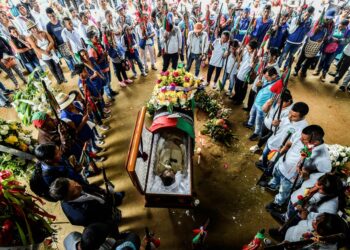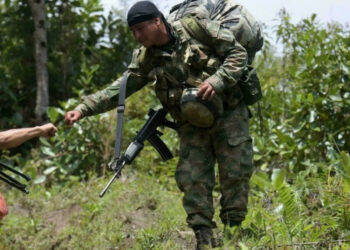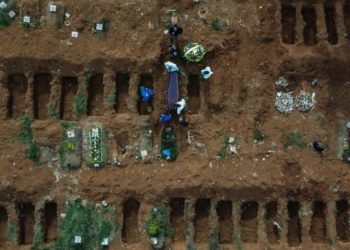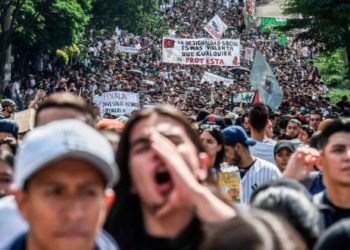In a surprising turn of events, members from Colombia’s President Ivan Duque’s governing Democratic Centre Party used pre-Christmas diversions to write a letter to the president with the suggestion to recant a 2016 decree that banned citizens from carrying arms. This demand found its way into a decree the president issued on Christmas Eve.
On the surface, the decree seems to extend the blanket ban on private guns. However, it includes a clause that potentially gives the Ministry of Defense the ability to define “urgent exceptions” and issue special authorizations to private citizens to carry guns.
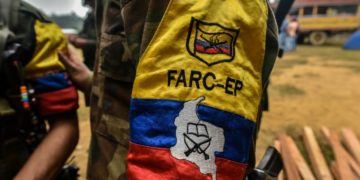
This saga appears surreal and counterintuitive; after all, a government probably ought to reduce the number of freely available guns to build a peaceful post-conflict society. Colombia’s security situation, unsurprisingly, is most challenging and complex, given the many actors, transformations of non-state order courtesy of the FARC-EP demobilization, and amount of illicit resources.
Nevertheless, it is difficult to claim ignorance when arming private citizens as part of a public policy to tackle those issues has only suboptimal results. In Colombia, the issue of private security comes with loads of baggage.
History of Paramilitaries
In the reporting on the peace process in recent years, Colombia’s history of paramilitaries has peculiarly fallen somewhat off the radar. Responsible for some of the worst atrocities in the Colombian theatre of war, paramilitaries are key to understanding the vicious nature of the conflict. Above all, the history of paramilitarism shows how political decisions and public policies that privatize public security can go awfully wrong.
Between the mid-1990s and early 2000s, policies legalizing private vigilante groups allowed those groups to morph into powerful private paramilitary armies. These, far from strengthening the government’s authority, systematically undermined the state’s monopoly of violence with devastating repercussions to democracy, the rule of law, and human rights.
#Colombia: Paramilitary group threatens indigenous protesters with ‘social cleansing’ http://t.co/g3b7iYzIwE
— Amnesty International USA (@amnestyusa) October 21, 2013
Colombian scholars conventionally distinguish between three generations of paramilitaries.
The first generation was essentially institutionalized by Carlos Lleras Restrepo’s administration (1966-70) as a response to the 1964 formation of the FARC. To fend off the guerilla, his government turned a decree into law (Law 48) that legalized and encouraged the creation of self-defense forces.
The second generation refers to the fusion of (mid-ranking) drug traffickers’ and cattle ranchers’ private armies against the FARC in rural Colombia by the late 1980s. The narcos had used drug profits to acquire land, essentially becoming landowners themselves, while the ranchero elite provided status in the social fabric of rural society to otherwise criminal actors.
The inaccessible context in rural Colombia, characterized by state absence, supplied the forming paramilitary armies with the opportunity to expand and control territory (a key factor for success in the illicit economy), while at the same time serving as a justification to use force as a measure of self-defense.
Ties Paramilitary Groups and Law Enforcement
The third generation of paramilitaries evolved after Pablo Escobar’s death in 1993. The police chase and his eventual death were important catalysts because they changed the politics of the drug economy and cemented informal links between paramilitary groups and law enforcement agencies.
It set in motion what scholars refer to as traquetización: the empowerment of middle-ranking narcos to the summit of the paramilitary project as traquetización (named after the sound of guns: “trr trr trr”). The war against drugs put the head of the large cartels in a competitive disadvantage against those mid-ranking enforcers that had bought land in the countryside and expanded their territorial control outside of urban hubs.
The decline of cartels also opened opportunities for the FARC-EP guerilla to expand into key trafficking routes and grow stronger, which in turn required the state to respond with new strategies. The response was the so-called CONVIVIR program (Spanish acronym for Vigilante Cooperatives and Private Security; 1994-1998).
CONVIVIR Program
Similar to the precedent of Law 48 from 1968 – which was discontinued in 1989 after the war with Pablo Escobar made the consequences of private assassin armies readily evident – CONVIVIR legalized local self-defense forces to fight-off the guerrilla and to compensate for the state’s absence.
Similar to Law 48, the program did not significantly weaken the guerrilla, neither did it compensate for the state’s absence. For the paramilitaries, however, CONVIVIR was the perfect vehicle to systematically expand control over key trafficking routes in Córdoba, Antioquia, and the South of Santander without facing any consequences from the state, while at the same time reducing FARC-EP presence in those drug trafficking routes.
The strategy paramilitaries used to exert control is usually, and euphemistically, described as “dumping the water with the child”: targeting the support web of the guerrilla (for example, civilians and perceived guerrilla collaborators) with assassinations and terror in order to weaken the guerrilla.

When public outrage and international pressure forced Ernesto Samper’s government (1994 – 1998) to shut down the CONVIVIR program, it did not end the paramilitary project. In fact, it became political, uniting agro-industrialists, narco-traffickers, militaries, and some national politicians under the umbrella of the AUC (Spanish acronym for United Self-Defense Forces of Colombia) – a national co-operative of local vigilante groups with a coordinated national expansion plan, internal organization statutes with different military fronts, and public appearances by leaders to justify the violence as a necessary response to the absence of the state and the presence of the guerrilla.
Paramilitary Leaders and Congress
That expansion plan directly aimed at Colombia’s democratic institutions. Through “armed campaigning” – vote buying and voter intimidation – paramilitaries facilitated the elections of selected Members of Congress, received legislative support in return, and, as a consequence, were more effectively protected from criminal prosecution. Members of Congress and paramilitary leaders even went so far as to formalize these relations into pacts that swore to re-found the nation.
These pacts became synonymous with the parapolítica scandal revealed after the AUC demobilization between 2006 and 2010. By their own admission, the paramilitaries had co-opted 35 percent of Congress, a number more or less validated in court. It went as far up as the cousin of former President Alvaro Uribe (2002 – 2010).
In fact, it remains still somewhat unclear to what degree Uribe’s election (and re-election) received illicit help. Several former AUC commanders have said as much. In short, though elections were held – even relatively free ones – it remains very questionable that the representation during the time of paramilitary influence was, in fact, democratic (surprising to some, Colombia is actually one of the oldest democracies in the hemisphere with no experiences of a military dictatorship).
Since the demobilization of the AUC between 2006-2010, we are, arguably, experiencing the fourth generation of paramilitaries, the so-called BACRIMs (Spanish acronym for Criminal Bands).
Weakness of Colombian State
If anything, the history of armed vigilante groups in Colombia shows that simply arming private citizens is not a good policy idea to confront a disconcerting security situation.
It is certainly true that crime and violence today is becoming more pronounced after years of declining homicide rates. Disturbingly, this violence specifically targets civic leaders that mobilize on behalf of a variety of groups, rights, and causes. In the past, however, vigilantism in Colombia did not protect those activists.

On the contrary, these civic leaders were often placed at the very top of paramilitary hit lists for alleged co-operation with the FARC-EP. They were also most often the victims of massacres that plastered paramilitary expansion during the CONVIVIR and AUC years.
What is more, enabling private security groups did little to actually address the core problem: the weakness of the Colombian state. Paramilitarism, far from creating a unified territory under the authority of a central government, divided the state.
We need to recall that paramilitaries, at least nominally, were a competitor of the state. Yet, armed campaigning gave paramilitary commanders the ability to delegate votes and thereby make “democratic” politicians dependent on them. Evidently, those elected politicians had little interest to strengthen the institutions of the democratic state against a non-state armed actor that facilitated their election in the first place.
Mistakes of the Past
Paramilitary structures built on links with agents and representatives of the Colombian state; and these links have had legal repercussions in Colombian and international courts.
The country’s Supreme Court and the Interamerican Court of Human Rights held the Colombian government responsible for atrocities committed by paramilitary death squads; either for negligence or active participation in atrocities by members from the security apparatus.
More importantly for the future, the Colombian government must avoid the mistakes of past political decisions that facilitated the paramilitary creation in the first place, and subsequently opened paths to systematically evade accountability, act with impunity, and give criminal actors a vehicle to mask their enterprises behind a political project that assumes an aura of legitimacy.
Disclaimer: The views and opinions expressed here are those of the author and do not necessarily reflect the editorial position of The Globe Post.


